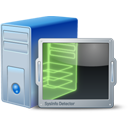Command line
Supported command line options:
SysInfoDetector.EXE [/R[M]] [[path\]filename[.ext]] [/?] [/H] [/SM] [/DRVINSTALL] [/CONFIG] [/SKIPSERVER] [/USEWH]
- /R — generate a report
- /RM — build file in the main program format
- path — full path to the report file
- filename — report filename
- ext — report file extension (default report file generated with the extension "SID")
- /? or /H — output of the command-line options
- /SM or /HIDE — hidden mode
- /DRVINSTALL — do not remove the driver after finished
- /CONFIG — enable/disable the scanning of the survey
- /SKIPSERVER — do not run the application on the server
- /USEWH — use file storage
Allowable macros in the path or name of report file:
- $HOSTNAME$ — Host name
- $USERNAME$ — User name
- $MACADDR$ — The primary MAC address of the network card
- $IPADDR$ — The primary IP address of the network card
- $DATE$ — Current date in YYYYMMDD
- $TIME$ — Current time in HHMMSS
- $YEAR$ — Current year in YYYY
- $MONTH$ — Current month in MM
- $DAY$ — Current day in DD
Integration with Hardware Inspector:
For the mass generation of reports on the configuration of all computers, you can use the following format in the domain logon-script:\\Server\SID\SysInfoDetector.exe /RM \\Server\CfgReports\$HOSTNAME$\$YEAR$\$YEAR$_$MONTH$_$HOSTNAME$.sid /HIDE /SKIPSERVER /DRVINSTALL
This allows a user logs on to the domain automatically generate a configuration report of his computer. In the future, this report will be used by the mechanism "Audit of workplaces" of applications Hardware Inspector and Hardware Inspector Client/Server to monitor a deviation in the computer configuration.
